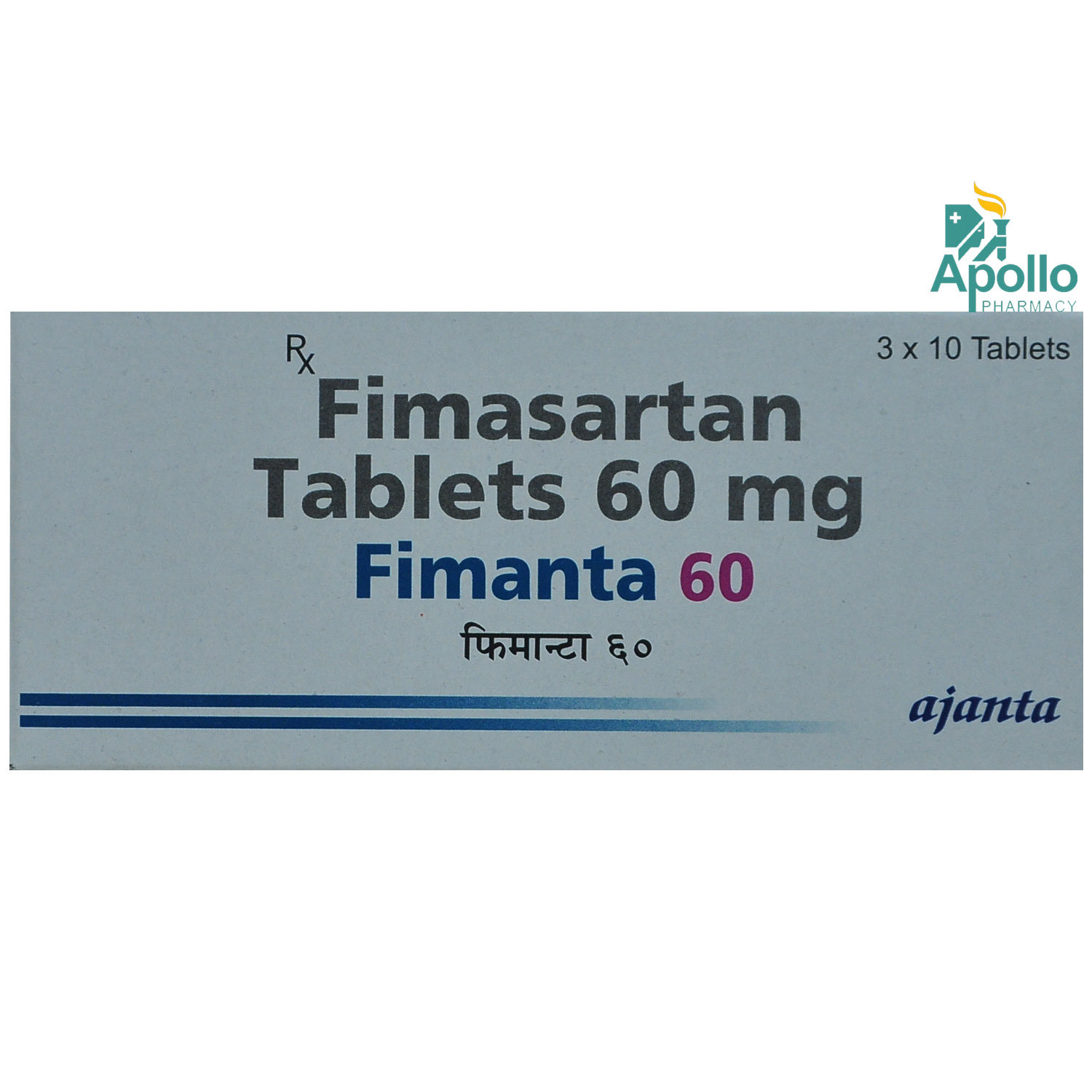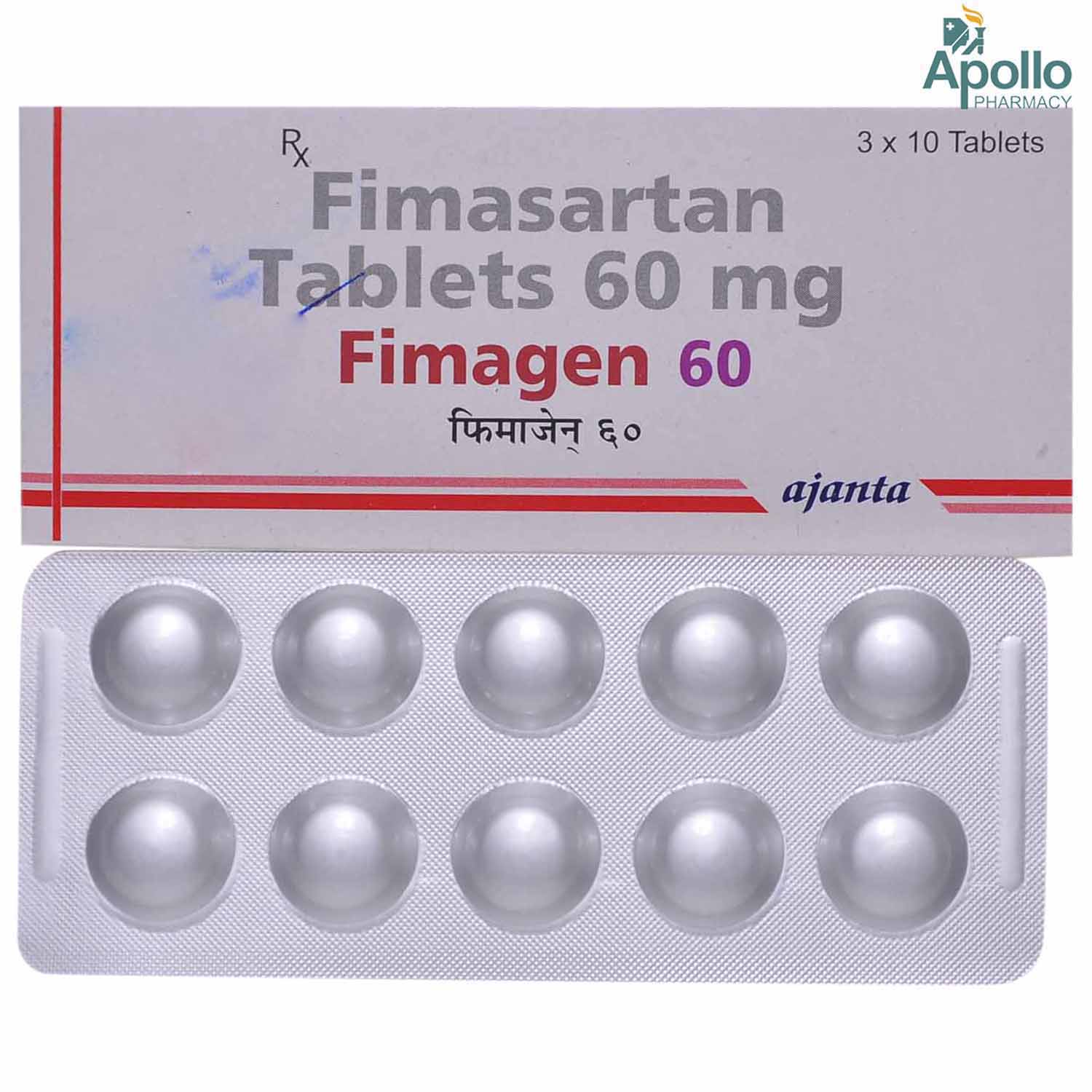Fimasartan
About Fimasartan
Fimasartan belongs to a group of medicines called angiotensin II receptor antagonists (blood pressure-lowering that are used for the treatment of hypertension (high blood pressure). Additionally, Fimasartan is used to reduce the risk of heart attack or stroke and kidney problems. Hypertension is a medical condition in which the blood exerts high blood pressure against the walls of the blood vessels. Due to this, the heart has to work harder to pump the blood supply in the whole body. On the other hand, heart attack or stroke occurs due to blocked blood flow to the heart or brain, respectively.
Fimasartan contains Fimasartan. It is an angiotensin receptor blocker (ARB). It works by blocking the hormone angiotensin, which usually makes blood vessels tighter, thereby relaxing blood vessels. This allows the blood to flow more smoothly and the heart to pump more efficiently. Thus, it lowers high blood pressure.
Take Fimasartan as prescribed by your doctor. You are advised to take Fimasartan for as long as your doctor has prescribed it for you, depending on your medical conditions. You may experience dizziness, sinus inflammation (cavities around the nasal passages become inflamed), back pain and increased potassium level in the blood. Most of these side effects of Fimasartan do not require medical attention and gradually resolve over time. However, if the side effects are persistent, reach out to your doctor.
Fimasartan should not be taken in conditions like diabetes, kidney disease and liver disease. You are recommended to avoid the consumption of alcohol with Fimasartan as it may increase the risk of low blood pressure and cause adverse effects such as dizziness, fainting, light-headedness or headache. Fimasartan is not for pregnant women as its use during your pregnancy can cause injury and even death to your unborn baby. It is not known whether Fimasartan passes into your breast milk or not. Your doctor will decide if you will take Fimasartan while using Fimasartan and breastfeeding together.
Uses of Fimasartan
Medicinal Benefits
Fimasartan is used in the treatment of heart failure, hypertension (high blood pressure), and prevention of heart attack and stroke. Fimasartan blocks the action of a chemical in the body that causes the narrowing of blood vessels leading to high blood pressure. Fimasartan lowering high blood pressure by widening and relaxing blood vessels. This medicine needs to be taken regularly to be effective.
Directions for Use
Storage
Side Effects of Fimasartan
-
Dizziness
-
Sinus inflammation (cavities around the nasal passages become inflamed)
-
Back pain
-
Increased potassium level in the blood
Drug Warnings
Fimasartan is not recommended for people with impaired kidney function, diabetes, or severe liver problems. Fimasartan may increase the risk of low blood pressure when taken with alcohol. Fimasartan may cause tiredness or dizziness in some people. Make sure you are not affected before driving. Taking Fimasartan with painkillers can increase the risk of kidney problems and reduces the efficacy of Fimasartan. Fimasartan has not been administered in elder patients more than 70 years of age. Fimasartan is not for pregnant women as its use during your pregnancy can cause injury and even death to your unborn baby. It is not known whether Fimasartan passes into your breast milk or not. Your doctor will decide if you will take Fimasartan while using Fimasartan and breastfeeding together. Fimasartan is not recommended for children less than 18 years of age as the safety and efficacy of Fimasartan are not established for children.
Drug Interactions
Drug-Drug Interaction: No interactions were found because it is still in trials.
Drug-Food Interaction: Fimasartan may interact with potassium supplements resulting in hyperkalemia (high level of potassium in the blood).
Drug-Disease Interaction: People with diabetes and impaired liver and kidney function should consult a doctor before taking Fimasartan.
Drug-Drug Interactions Checker List:
Safety Advice

Alcohol
unsafeYou are recommended to avoid consumption of alcohol while taking Fimasartan. as it may increase the risk of low blood pressure and cause side effects such as dizziness, fainting, light-headedness or headache.

Pregnancy
unsafeFimasartan is not for pregnant women as its use during your pregnancy can cause injury and even death to your unborn baby.

Breast Feeding
cautionThe safe use of Fimasartan in breastfeeding mothers has not yet been established. So, it should be used in breastfeeding women only when prescribed by a doctor.

Driving
cautionFimasartan may cause dizziness or tiredness in some people. So, make sure you are not affected before driving or operating machinery.

Liver
cautionTake Fimasartan with caution, especially if you have a history of liver disease. The dose may be adjusted by your doctor as required. Fimasartan is not recommended for patients with severe liver disease.

Kidney
cautionTake Fimasartan with caution, especially if you have a history of kidney diseases/conditions. The dose may be adjusted by your doctor as required. Fimasartan is not recommended for patients with severe kidney disease.

Children
unsafeIt is not recommended for children below 18 years as the safety and effectiveness in children are not established.
Habit Forming
Diet & Lifestyle Advise
-
Maintain a low-salt diet and minimize eating processed foods as they contain more sodium. Try to replace salt with spices or herbs to add flavour to the food.
-
Do regular exercise such as cycling, walking, jogging, dancing, or swimming for a minimum of 30 minutes per day.
-
Chronic stress may also cause high blood pressure. Therefore, avoid stress by changing your expectations, how you react in certain situations and making time for yourself to do activities that you enjoy.
-
Maintain a diet rich in fruits, vegetables, whole grains, and low-fat dairy products.
-
Avoid smoking and alcohol intake.
Special Advise
- Monitor your blood pressure regularly, and if you notice any fluctuations, please consult a doctor.
- Low salt diet and regular exercise are recommended along with Fimasartan for effective results.
Patients Concern
Disease/Condition Glossary
Hypertension: It is a chronic condition when blood pressure is too high. Blood pressure is the amount of blood pumped by the heart and the amount of resistance exerted by the arteries against the blood flow. If the heart pumps more blood, then arteries become narrower, and in turn, blood pressure becomes high. If blood pressure becomes uncontrolled, it may cause serious heart disease, including stroke and heart attack. High blood pressure also causes brain damage (stroke) and kidney failure. Blood pressure is expressed by systolic and diastolic. Systolic blood pressure represents the contraction and relaxation of the heart. Diastolic represents the pressure in the vessels when the heart beats and is in a resting state. Ideal blood pressure should be between 90/60mmHg and 120/80mmHg. Hypertension is detected when systolic blood pressure is more than 140mmHg, and diastolic pressure is higher than 90mmHg. Some symptoms of hypertension include headache, nosebleeds, vomiting, and chest pain.
Cardiovascular risk: It is usually diagnosed in patients older than 55 and is characterized by blood vessel disease in the heart, brain, or legs (coronary, peripheral, or cerebral vascular disease) or diabetes with organ damage.
FAQs
Fimasartan may take about 2 weeks to show a visible decrease in blood pressure. Full advantages of Fimasartan may take a little longer, about 4 weeks.
You need to know that this Fimasartan can lead to harm or death to your unborn baby. Therefore, if you are planning a pregnancy or have become pregnant, inform your doctor immediately. Your doctor may switch you to a different medicine to treat your high blood pressure.
Yes. You can keep hypertension if you are in the high-risk group. It is advisable to you can take some steps like limiting your salt intake, eating a healthy diet, staying physically active, maintaining a healthy weight, limiting alcohol intake, managing stress efficiently, etc., to prevent hypertension even when you have increased risk factors. And do not forget your routine health check-ups.
Fimasartan may interact with potassium supplements resulting in hyperkalemia (high potassium levels in the blood). It may cause severe adverse effects such as irregular heartbeat, muscle paralysis, and kidney failure.
Both Fimasartan and telmisartan are blood pressure-lowering medicines. Fimasartan is a relatively new medicine. It is as effective as telmisartan in lowering blood pressure. It can be safely used in patients as it has some side effects.
Take the missed dose as soon as possible. However, if it is time for the next dose, skip the missed dose and return to your regular dosing schedule.




